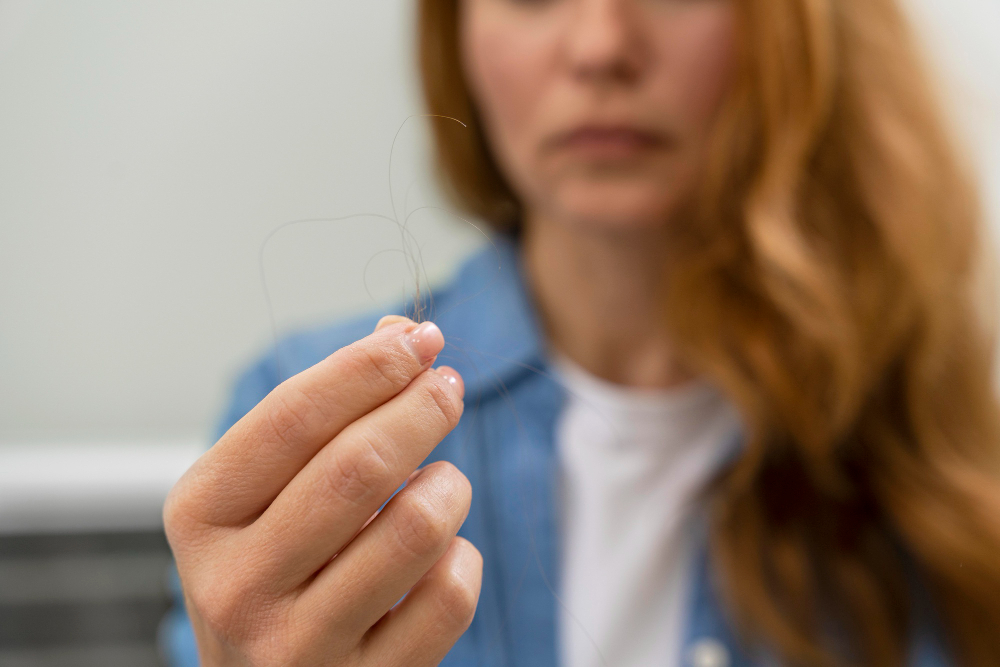Table of Contents
Understanding Hair Loss: Causes and Symptoms
Hair loss can be a troubling experience, affecting self-esteem and confidence. Several factors contribute to hair loss, including genetics, stress, hormonal imbalances, and lifestyle habits. One of the earliest signs of hair loss is noticing more strands in your brush or shower drain than usual. Thinning hair can also become more visible around the crown or temples. Tips to control hair fall:- To control hair loss, use good shampoo/conditioner
- Maintain proper diet & exercises
- Massages with essential oils
- Avoid smoking & drinking
- Reduce your stress
- Avoid continuous heating and drying
The Role of Diet in Hair Health
A balanced diet plays a crucial role in maintaining hair health. Nutrients such as vitamins A, C, D, and E, as well as biotin, iron, and omega-3 fatty acids, are essential for hair growth. Foods rich in these nutrients include leafy greens, nuts, seeds, and fatty fish. Best home remedies for hair loss:- Egg Masks
- Onion Juice
- Indian Gooseberry
Herbal Remedies for Hair Loss
Nature offers a variety of herbs that promote hair growth. Aloe vera, known for its soothing properties, can also encourage hair regrowth by improving scalp health. Simply apply fresh aloe gel to your scalp and leave it on for 30 minutes before rinsing. Rosemary oil is another powerful remedy for hair loss. Studies suggest that rosemary oil can be as effective as minoxidil, a common treatment for hair loss, in promoting hair regrowth. Ginseng, a staple in traditional medicine, can also stimulate hair follicles and strengthen roots.Essential Oils for Hair Regrowth
Essential oils are not just aromatic; they can also promote hair growth. Lavender oil, with its antimicrobial properties, helps soothe the scalp and reduce dandruff, while peppermint oil can stimulate blood circulation to the scalp, encouraging hair growth. To use these oils, mix a few drops with a carrier oil like coconut or jojoba oil and massage it into your scalp.Massaging Techniques to Stimulate Hair Follicles
Scalp massages not only feel relaxing but also boost blood flow to hair follicles. Increased circulation helps deliver essential nutrients to your hair, encouraging growth. You can perform scalp massages with your fingers or with a soft brush, gently massaging in circular motions for 5-10 minutes daily. DIY Hair Masks for Hair Loss: Homemade hair masks made from natural ingredients can nourish and strengthen your hair. Ingredients like eggs, honey, avocado, and yogurt provide moisture and essential nutrients that hair needs. A popular recipe for hair growth includes mixing one egg yolk, a tablespoon of honey, and two tablespoons of coconut oil. Apply the mask to damp hair, leave it on for 20 minutes, and rinse thoroughly.The Importance of Hydration in Preventing Hair Loss
Hydration is key to overall hair health. Dehydration can cause hair to become brittle and prone to breakage. Drinking at least 8 glasses of water a day helps keep your hair hydrated from within. You can also use hydrating hair products such as leave-in conditioners or moisturizing serums to maintain healthy lifestyle habits , supple hair. Stress Management and Its Impact on Hair Loss: Stress is a major contributor to hair loss. When the body is under stress, it releases cortisol, a hormone that can disrupt the hair growth cycle. Practicing relaxation techniques such as yoga, meditation, or deep breathing exercises can help manage stress levels and, in turn, reduce hair loss.The Benefits of Regular Exercise for Hair Growth
Exercise is not only great for your overall health but also for your hair. Physical activity increases blood flow, ensuring that your scalp receives the nutrients and oxygen it needs to promote healthy hair growth. Improved circulation helps nourish hair follicles, which can slow down hair thinning and encourage regrowth. Cardiovascular exercises like running, swimming, and cycling are particularly effective for boosting circulation. Yoga, with its focus on relaxation and reducing stress, can also help with hair loss by addressing one of its common causes—stress. Incorporating at least 30 minutes of exercise into your daily routine can make a noticeable difference in your hair health over time.Natural Supplements for Hair Loss
For some, diet alone may not provide all the nutrients needed to support hair growth, which is where supplements can help. Biotin, a B-vitamin, is one of the most popular supplements for promoting stronger hair. It helps improve the structure of keratin, the protein that makes up hair, skin, and nails. Collagen is another supplement that has gained popularity for hair growth. As we age, our body produces less collagen, which can lead to weaker hair and a thinner appearance. Taking collagen supplements can improve hair elasticity and reduce breakage. Other beneficial supplements include zinc, iron, and vitamin D, all of which play critical roles in maintaining hair health.Common Mistakes to Avoid When Treating Hair Loss
While seeking solutions for hair loss, it’s important to avoid common mistakes that can worsen the issue. One of the biggest mistakes is over washing your hair. Frequent shampooing strips the scalp of natural oils, leading to dryness and brittle hair. Instead, aim to wash your hair two to three times a week with a gentle, sulfate-free shampoo. Using harsh hair products, such as those containing alcohol or parabens, can also damage hair and contribute to hair loss. Opt for natural, nourishing products that promote scalp health. Additionally, avoid hairstyles that put excessive tension on the hair oil, like tight ponytails or braids, as they can cause hair breakage and thinning over time.Lifestyle Changes to Prevent Hair Loss
Simple lifestyle changes can go a long way in preventing hair loss and promoting healthier hair. Reducing the use of heat styling tools, such as flat irons and blow dryers, can help prevent hair from becoming dry and damaged. When you do use heat, always apply a heat protectant spray to minimize the damage. Protective hairstyles, such as loose braids or buns, can also prevent unnecessary strain on your hair. Additionally, sleeping on a silk pillowcase can reduce friction between your hair and the pillow, helping to minimize breakage.External Factors Contributing to Hair Loss
External factors such as pollution, UV rays, and chemical exposure can all negatively impact hair health. Pollution, in particular, can clog hair follicles and inhibit healthy hair growth. When spending time outdoors, consider wearing a hat or using hair products that offer UV protection to shield your hair from the sun’s harmful rays. Hormonal imbalances, especially in women, can also contribute to hair loss. Conditions such as polycystic ovary syndrome (PCOS) or thyroid dysfunction can disrupt the normal hair growth cycle. If you suspect hormonal issues are behind your hair loss, it’s essential to consult with a healthcare professional for proper diagnosis and treatment.FAQs About Home Remedies for Hair Loss
- Are natural remedies effective for everyone?
- Natural remedies can be effective, but results may vary based on the individual’s underlying cause of hair loss. They are a good starting point for those seeking a gentle, holistic approach to hair care.
- How long does it take to see results?
- Most home remedies require consistent use for several weeks or even months to show visible results. Patience is key.
- Can hair loss be reversed with natural treatments?
- In some cases, hair loss can be slowed or even reversed with natural treatments, especially if caught early. However, for more severe conditions like genetic hair loss, natural remedies may only help improve hair health rather than fully reverse hair loss.
- Do essential oils really work for hair regrowth?
- Essential oils like rosemary, peppermint, and lavender have been shown to support hair regrowth by improving scalp health and stimulating hair follicles. However, results can vary from person to person.
- What are the best vitamins for hair loss?
- Vitamins like biotin, vitamin D, vitamin E, and zinc are considered essential for promoting hair growth and reducing hair loss. A balanced diet with these nutrients can improve hair health.
- Is hair loss more common in men or women?
- Hair loss is more common in men, particularly due to male pattern baldness, which is often genetic. However, women also experience hair thinning and loss, especially due to hormonal changes, stress, and aging.

